
Pharmacogenomics & Personalized Medicine
Scope & Guideline
Innovating patient care with tailored therapeutic approaches.
Introduction
Aims and Scopes
- Pharmacogenomics and Drug Response:
Research exploring the genetic factors influencing individual responses to medications, including polymorphisms in drug-metabolizing enzymes and transporters. - Cancer Genomics and Personalized Treatment:
Studies investigating the genetic underpinnings of cancer, including biomarkers for prognosis, treatment response, and the development of targeted therapies. - Clinical Applications of Pharmacogenomics:
Research highlighting the practical implementation of pharmacogenetic testing in clinical settings, aiming to tailor treatments based on genetic profiles. - Genetic Epidemiology and Disease Susceptibility:
Exploration of genetic variants associated with the risk and prognosis of various diseases, enhancing understanding of population-specific health issues. - Innovative Therapeutic Strategies:
Development and validation of novel therapeutic approaches based on genetic insights, including gene therapies and personalized medication regimens.
Trending and Emerging
- Integration of Artificial Intelligence in Pharmacogenomics:
Research utilizing AI and machine learning to analyze genetic data for predicting drug responses and optimizing treatment regimens is gaining traction. - Immune Microenvironment and Cancer Therapy:
Emerging studies focus on the relationship between genetic variations and the immune microenvironment, particularly in cancer therapies and immunotherapy responses. - Long Non-Coding RNAs in Disease Mechanisms:
Increasing research on the role of long non-coding RNAs in various diseases, their prognostic value, and their potential as therapeutic targets. - Ethnic Diversity in Pharmacogenomics:
A growing emphasis on studying pharmacogenomic variations across different ethnic groups, enhancing the understanding of population-specific drug responses. - Personalized Nutrition and Pharmacogenomics:
Research exploring the intersection of nutrition, genetics, and pharmacotherapy, highlighting how genetic factors can inform dietary recommendations alongside medication.
Declining or Waning
- General Pharmacology Studies:
Traditional pharmacology studies that do not incorporate genetic factors or personalized approaches are becoming less prevalent, as the field shifts towards more tailored medicine. - Case Reports without Genetic Insights:
Case reports that do not focus on genetic variations or pharmacogenomic implications are less common, reflecting a shift towards genetic and molecular understanding in clinical cases. - Broad Epidemiological Studies:
While epidemiological studies remain important, those lacking a genetic component or personalized approach are increasingly overshadowed by studies integrating genomics into health outcomes.
Similar Journals
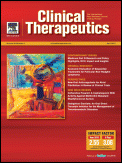
CLINICAL THERAPEUTICS
Innovating pharmacology for a healthier tomorrow.Clinical Therapeutics, published by Elsevier, is a highly esteemed peer-reviewed journal that has been pivotal in advancing the field of pharmacology since its inception in 1977. With an impressive impact factor and recognition as Q2 in Pharmacology and Q1 in Medical Pharmacology for 2023, it stands at the forefront of research and discussions on innovative therapeutic strategies and pharmacological advancements. This journal not only caters to a broad audience of researchers and clinicians but also plays a vital role in disseminating critical information that supports the enhancement of patient care and safety. As a repository of high-quality, evidence-based articles, Clinical Therapeutics is a crucial resource for those involved in drug development, medical research, and clinical practice, making it an essential read for anyone dedicated to improving health outcomes through pharmaceutical sciences.

Molecular Diagnosis & Therapy
Shaping Tomorrow's Treatments TodayMolecular Diagnosis & Therapy, published by ADIS INT LTD, is a premier journal dedicated to the cutting-edge fields of genetics, molecular medicine, and pharmacology. With a strong emphasis on the translation of molecular insights into innovative therapeutic strategies, this journal serves as a vital resource for researchers, clinicians, and students aiming to stay at the forefront of medical and scientific advancements. The journal boasts an impressive standing in its categories, holding a Q1 ranking in Genetics, Medicine (miscellaneous), and Pharmacology, alongside a Q2 classification in Molecular Medicine for 2023, reflecting its influential contributions to the scientific community. Indexed in Scopus, it occupies distinct positions in its respective fields, ranked #77 in Genetics and Pharmacology, and #53 in Molecular Medicine, highlighting its robust impact factor and scholarly influence. Although it is not open access, the journal ensures widespread dissemination of valuable research, promoting enhanced understanding of molecular diagnostic techniques and therapeutic interventions. Since its inception in 2001, and continuing through to 2024, Molecular Diagnosis & Therapy remains an essential platform for disseminating vital research findings, fostering academic collaboration, and driving forward the dialogue in molecular diagnostics and treatment methodologies.
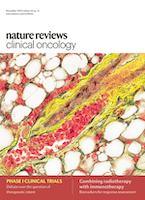
Nature Reviews Clinical Oncology
Exploring Breakthroughs in Clinical OncologyNature Reviews Clinical Oncology is a premier journal dedicated to the comprehensive exploration and critical evaluation of current advancements in the field of clinical oncology. Published by the esteemed NATURE PORTFOLIO in the United Kingdom, this influential journal boasts an impressive impact factor that reflects its significant role in shaping oncology research. As a Q1 ranked journal in Scopus, it occupies a notable position within the top tier of oncology publications, placing it in the 99th percentile among its peers. With a history of convergence from 2009 to 2024, it presents high-quality content through an open-access model, ensuring accessibility to vital research findings. Researchers, professionals, and students alike will find Nature Reviews Clinical Oncology an invaluable resource for staying abreast of the latest trends, biologic insights, and therapeutic innovations that drive the future of cancer treatment.
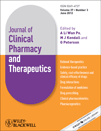
JOURNAL OF CLINICAL PHARMACY AND THERAPEUTICS
Bridging pharmacology and therapy for better patient outcomes.JOURNAL OF CLINICAL PHARMACY AND THERAPEUTICS, an esteemed publication in the field of pharmacology, is published by Wiley-Hindawi and has been at the forefront of clinical research since its inception in 1976. Operating primarily from the United Kingdom, this journal features a diverse array of articles that encompass both fundamental and practical aspects of clinical pharmacy, thereby supporting the advancement of therapeutic practices. With an ISSN of 0269-4727 and an E-ISSN of 1365-2710, it is indexed in key databases and holds respectable ranks within its categories; achieving Q3 in Pharmacology and Q2 in Medical Pharmacology in the latest quartile rankings. Its Scopus ranking reflects both its quality and relevance, being positioned in the 55th percentile for medical pharmacology and the 45th for pharmacology, toxicology, and pharmaceutics. Although it does not currently operate under an Open Access model, the journal's extensive readership and rigorous peer-review process ensure that the latest research reaches practitioners and academics alike. With a commitment to bridging the gap between pharmacological science and clinical practice, the JOURNAL OF CLINICAL PHARMACY AND THERAPEUTICS remains a critical resource for professionals striving to enhance patient outcomes through informed medication management.
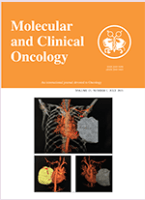
Molecular and Clinical Oncology
Transforming insights into impactful oncology practices.Molecular and Clinical Oncology is a dynamic journal published by SPANDIDOS PUBL LTD, aimed at advancing the understanding of cancer biology and treatment modalities. With an ISSN of 2049-9450 and an E-ISSN of 2049-9469, the journal serves as a critical platform for researchers and clinicians dedicated to uncovering novel insights in molecular oncology and enhancing clinical practices. As a testament to its growing influence, the journal has achieved a Q3 ranking in Oncology and a Q4 ranking in Cancer Research for the year 2023, reflecting its commitment to publishing high-quality research. Although currently not an Open Access publication, the journal offers crucial subscription options, ensuring comprehensive access to groundbreaking studies and innovations in the field. With converged years spanning 2018 to 2024, the journal is set to continue enriching the academic community with its valuable contributions, ultimately empowering researchers, professionals, and students engaged in the fight against cancer.

CANCER CHEMOTHERAPY AND PHARMACOLOGY
Unveiling the future of oncology through rigorous pharmacological research.Cancer Chemotherapy and Pharmacology, published by Springer, is a leading peer-reviewed journal that plays a crucial role in the field of cancer research and drug therapy. With an ISSN of 0344-5704 and an E-ISSN of 1432-0843, this journal has been a cornerstone of oncology and pharmacology research since its inception in 1978, with continued relevance through to 2024. The journal holds a commendable Q2 ranking in categories such as Cancer Research, Oncology, and Pharmacology (medical), while achieving an elite Q1 status in Toxicology, reflecting its high-impact contributions to the scientific community. Researchers and professionals benefit from access to cutting-edge studies, insightful reviews, and innovative methodologies, making it a vital resource for anyone working at the intersection of pharmacology and oncology. Although not an open-access journal, Cancer Chemotherapy and Pharmacology remains highly accessible through institutional subscriptions, ensuring it reaches a broad audience dedicated to advancing cancer treatment and patient care.
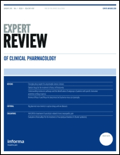
Expert Review of Clinical Pharmacology
Empowering clinicians with the latest in pharmacological advancements.Expert Review of Clinical Pharmacology, published by TAYLOR & FRANCIS LTD, is a leading peer-reviewed journal dedicated to the field of clinical pharmacology, with a strong focus on the development and application of pharmacological therapies in patient care. Boasting an impressive impact, the journal ranks in the first quartile across multiple categories including Medicine (miscellaneous), Pharmacology (medical), and Pharmacology, Toxicology and Pharmaceutics (miscellaneous), reflecting its influential position within the scientific community. With a Scopus ranking of #6 in General Pharmacology, Toxicology and Pharmaceutics, the journal also achieves a commendable 93rd percentile, further emphasizing its importance as a resource for researchers and clinicians alike. As it continues to publish innovative reviews and research articles from 2008 until 2024, the Expert Review of Clinical Pharmacology plays an essential role in advancing knowledge, improving clinical practice, and fostering collaboration among experts in pharmacology, thereby driving forward the field's evolution towards better patient outcomes.
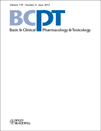
BASIC & CLINICAL PHARMACOLOGY & TOXICOLOGY
Connecting Basic Science with Clinical ApplicationsBASIC & CLINICAL PHARMACOLOGY & TOXICOLOGY, published by WILEY, serves as a vital resource in the fields of medicine, pharmacology, and toxicology. With an ISSN of 1742-7835 and E-ISSN 1742-7843, this journal has established a robust reputation, reflected in its Q2 classification across its categories in 2023. It aims to disseminate high-quality research and reviews that bridge the gap between basic scientific findings and clinical applications. Operating from the United States with an address at 111 RIVER ST, HOBOKEN 07030-5774, NJ, this journal focuses on the intersection of drug action and toxicity, making it an essential platform for researchers, healthcare professionals, and students. With a converged publication timeline from 2004 to 2024, BASIC & CLINICAL PHARMACOLOGY & TOXICOLOGY continues to make significant contributions to understanding pharmacological treatments and toxicological challenges. Open access options are available to broaden the reach and impact of its published work.
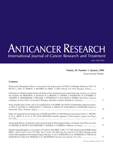
ANTICANCER RESEARCH
Innovating Strategies for Cancer CombatANTICANCER RESEARCH, published by the International Institute of Anticancer Research, stands at the forefront of cancer-related scholarly communication. With ISSN 0250-7005 and E-ISSN 1791-7530, this esteemed journal has been serving the global research community since 1981, showcasing innovative research aimed at combating cancer through various therapeutic approaches and scientific inquiry. Based in Greece, the journal aims to disseminate vital findings in the fields of Cancer Research, Medicine, and Oncology, reflecting its notable categorization in the Q3 and Q2 quartiles as of 2023. Despite its rigorous peer-review process and the absence of open access, ANTICANCER RESEARCH remains a vital publication for researchers, clinicians, and students eager to stay updated on the evolving landscape of anticancer strategies. As it converges to its milestone year of 2024, the journal continues to enrich the discourse around cancer treatment and prevention, affirming its position as an essential resource for those dedicated to advancing knowledge in anticancer therapies.

Breast Cancer-Targets and Therapy
Advancing breast cancer research for better patient outcomes.Breast Cancer-Targets and Therapy is a leading journal in the field of oncology, published by DOVE MEDICAL PRESS LTD in New Zealand. Established as an Open Access journal in 2009, it offers a platform for researchers and healthcare professionals to disseminate innovative findings and therapeutic strategies related to breast cancer. With an impressive ranking in the Q2 category of oncology journals as of 2023, and placed at Rank #203/404 in the Scopus database, this journal facilitates the exchange of high-quality research aimed at improving patient outcomes and advancing clinical practices. Covering a wide array of topics from basic research to clinical trials, Breast Cancer-Targets and Therapy plays a crucial role in bridging the gap between scientific discovery and practical application. Researchers, professionals, and students alike will find the journal a valuable resource for the latest advancements and best practices in breast cancer treatment.